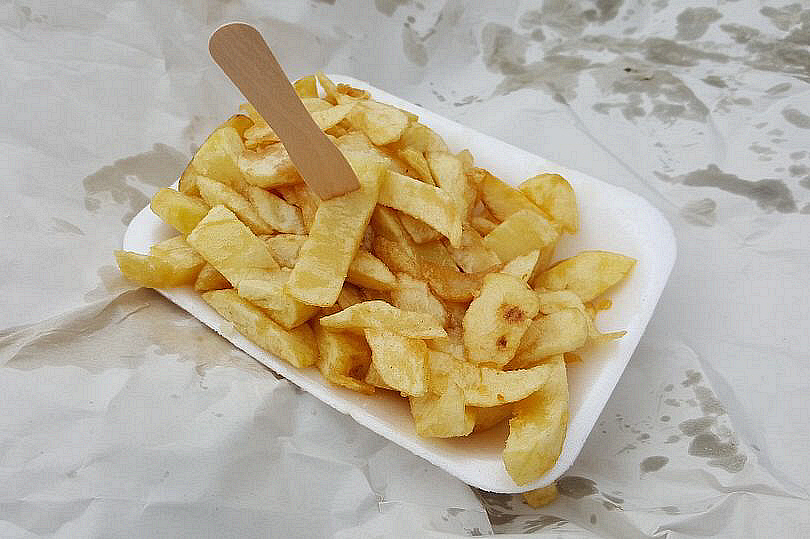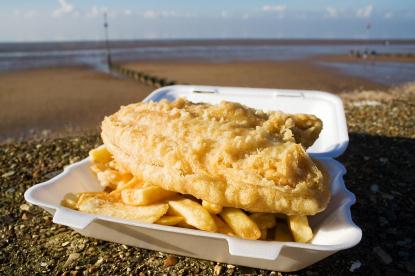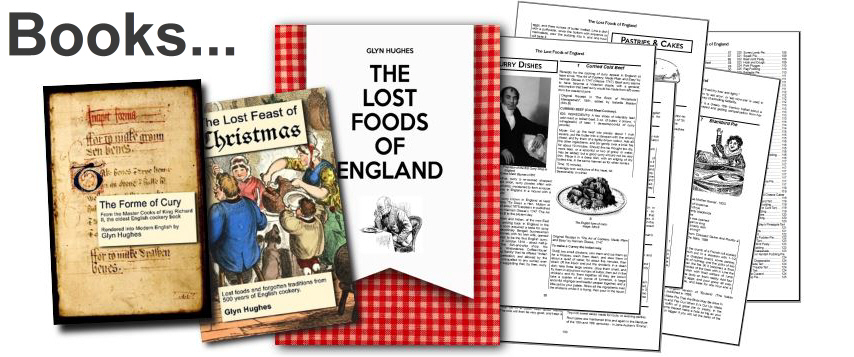

|
 Potato batons, fried.  Cooks have been frying small pieces, 'chips', of vegetables in oil since time immemorial, so it is reasonable to assume that the experiment was tried with potatoes not long after they arrived in Europe in 1536, though the first actual reference to fried potatoes in an English cookbook is not until May's 'The Accomplisht Cook' of 1660, and there just in passing as an accompaniment to small birds; "and some artichocks, and potato's boil'd and fried in Butter." Fried potato get mention here and there from the 1600s, but, seemingly usually in the form of rounds, as in this from Hannah Glasse in 1747..  Original Receipt in 'The Art of Cookery, Made Plain and Easy' by Hannah Glasse, 1747 (Glasse 1747); Original Receipt in 'The Art of Cookery, Made Plain and Easy' by Hannah Glasse, 1747 (Glasse 1747);To fry Potatoes Cut them into thin Slices, as big a Crown-piece, fry them brown, lay them in the Plate or Dish, pour melted Butter, and Sack and Sugar over them.  Fish and Chips Photo: Andrew Dunn Other earlier receipts for fried potato suggest a long, ribbon-like, pared form (see: Potato Ribbons), and even the first usage of the actual phrase "potato chips", in the 'English Cookery' of Walsh 1859 has "pare them, ribbon-like, into long lengths ... and fry them a light brown", the same year as Charles Dickens 'Tale of Two Cities'; "Husky chips of potatoes, fried with some reluctant drops of oil". Chips are often thought of as a Belgian National Dish, but the distinguished food historian Pierre Leclerc, himself a Belgian, defers to their origin as 'French Fries' "It is clear that the fried potato was invented at the beginning of the 19th century in Paris.. it was Parisian street fry vendors, they were the ones who made the fried potato the popular emblematic Parisian dish of the 19th century before this fries be exported to Belgium. It is clear that the fries are of French origin". (www.histoiredelafrite.com). That France is the home of Potato Fries is likely thanks to Antoine-Augustin Parmentier, the pioneering 18/19Cent French pharmacist and agronomist, who, when not promoting smallpox vaccines and inventing beet sugar, was a vigorous promoter of the virtues of the potato. See: Hannah Glasse's Potato  Original Receipt from 'The English Cookery Book' edited by JH Walsh Walsh 1859; Original Receipt from 'The English Cookery Book' edited by JH Walsh Walsh 1859;641 Potato Chips. Wash and peel some potatoes, then pare them, ribbon-like, into long lengths; put them into cold water to remove the strong potato flavour; drain them, and throw them into a pan with a little butter, and fry them a light brown. Take them out of the pan, and place them close to the fire on a sieve lined with clean writing paper to dry, before they are served up. A little salt may be sprinkled over them.  |
|
MORE FROM Foods of England... Cookbooks ● Diary ● Index ● Magic Menu ● Random ● Really English? ● Timeline ● Donate ● English Service ● Food Map of England ● Lost Foods ● Accompaniments ● Biscuits ● Breads ● Cakes and Scones ● Cheeses ● Classic Meals ● Curry Dishes ● Dairy ● Drinks ● Egg Dishes ● Fish ● Fruit ● Fruits & Vegetables ● Game & Offal ● Meat & Meat Dishes ● Pastries and Pies ● Pot Meals ● Poultry ● Preserves & Jams ● Puddings & Sweets ● Sauces and Spicery ● Sausages ● Scones ● Soups ● Sweets and Toffee ● About ... ● Bookshop ● Email: editor@foodsofengland.co.uk COPYRIGHT and ALL RIGHTS RESERVED: © Glyn Hughes 2022 BUILT WITH WHIMBERRY |